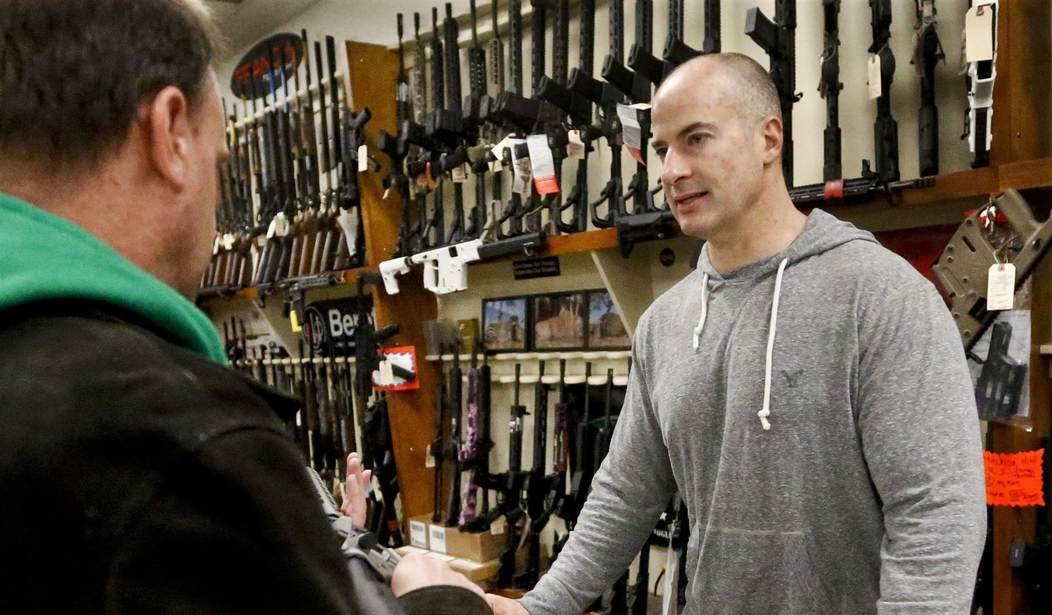Suicide is the biggest source of so-called gun deaths in the United States. The vast majority of the time, the life taken through “gun violence” is someone taking their own. It’s a terrible tragedy and one not served by restricting guns somehow.
Instead, it’s far better served by addressing the underlying causes for it.
That’s part of it, at least.
However, in Wyoming, suicide by firearm is a real problem. While it has a ridiculously low homicide rate, it’s “gun death” rate is high because of people taking their own lives.
Yet some there are looking at ways to address the problem without gun control.
hortly after Christina Williams’ fiancé died last spring, her three daughters came to her crying. They said they missed their dad. It got to be too much for her.
“I couldn’t handle my grief or my girls’ grief at the same time,” Williams says.
She made a plan, as grief counselors call it, to take her life that day. But by chance, a couple of hours later, while stopped at a traffic light on Dell Range Boulevard in Cheyenne, she saw a sign for LIV Health, a newly opened mental health urgent care clinic.
She decided to drive in right then. Without an appointment, she was seen immediately by a crisis clinician and a psychiatric nurse practitioner.
One of the first questions that crisis clinician Sarai Guerrero-Vasquez asked Williams when she first came in is now an increasingly normal standard across Wyoming: Where are the guns stored at home?
“I always assure them, ‘I’m just a social worker — I’m not going to go into your house and take anything,'” Guerrero-Vasquez says. “I just want to make sure that you stay safe, and if that means having a family member secure them for a little bit until you go through this bump, life will resume.”
Of course, Guerrero-Vasquez means it and Wyoming is the kind of state where someone can talk to a social worker like her and deal with the actual problem without worrying if someone is going to come in and take their guns from them by force, making them prove they’re better before they can get them back.
But that’s the reality in a lot of places.
Still, Guerrero-Vasquez focuses on people handing guns over to friends or family, getting them out of the house. So do a lot of others.
In blue America, the reflexive response to gun violence is often a moveto restrict access to firearms. With gun control a nonstarter here, prevention workers like Lauren SinClair of the Department of Veterans Affairs talk instead about creating time and space between a person in crisis and a gun.
One recent week, she had logged hundreds of miles in her Toyota hybrid minivan crisscrossing southern Wyoming visiting local gun shops and advocating for safe storage — where a customer can bring their guns in and store them temporarily in a safe, no questions asked.
At an unannounced drop-in at Frontier Arms & Supply in Cheyenne, she explained to counter staff: “Maybe their teenager is in crisis or they themselves were just saying, ‘Hey, I’m not in the right space to have my firearm at home with me right now. Can you hold that?'”
She was pleased to learn that the shop was already offering this service and getting willing participants. SinClair lost her mother to suicide by firearm when she was a little girl. She says that for too long, suicide prevention and guns were completely siloed from one another in Wyoming.
SinClair’s efforts are a good thing. I don’t know if she’d prefer a gun control solution or not, but what she’s working toward is one that should be an easy, no-brainer.
Unfortunately, outside of Wyoming, there can be issues.
A lot of places create hurdles for handing guns over to safe hands. If your local gun store either can’t or won’t take your guns short-term, you run into a problem handing them over to others. After all, doing so could be illegal.
In universal background states, for example, it may well be illegal to hand your gun collection over to a friend for safekeeping. They want you to go to a gun store and conduct a background check to make sure the guy you’ve known and seen three times a week since third grade isn’t a felon.
Then let’s take Guerrero-Vasquez’s work as another example.
She isn’t interested in coming into your home and taking anything. Moreover, Wyoming’s laws wouldn’t allow her to do it even if she were interested.
In other places, though, there are those in the same profession who are inclined to use the state’s red flag laws to come in and take someone’s guns from them by force. As a result, many gun owners may be hesitant to even acknowledge they have a firearm, if they bother to seek help at all.
Suicide is a legitimate problem, and not just for the gun community. Focusing on the mental health aspects are important, but from a firearm standpoint, it would be nice to see suicides taken seriously and viewed from a standpoint of not trying to punish someone already suffering.
Wyoming seems to have people looking to do just that.








Join the conversation as a VIP Member